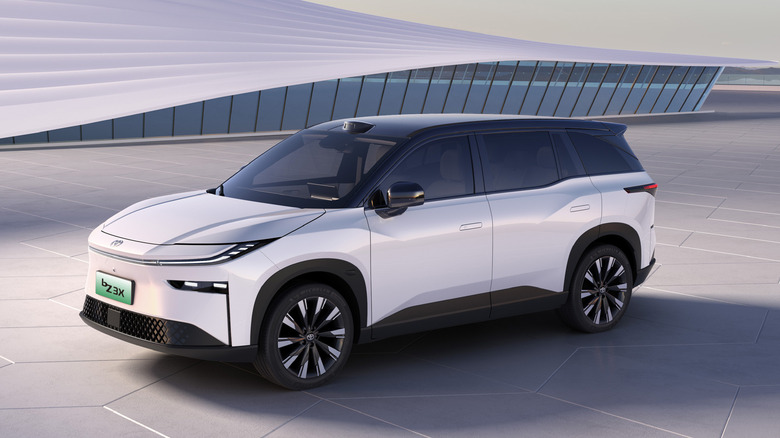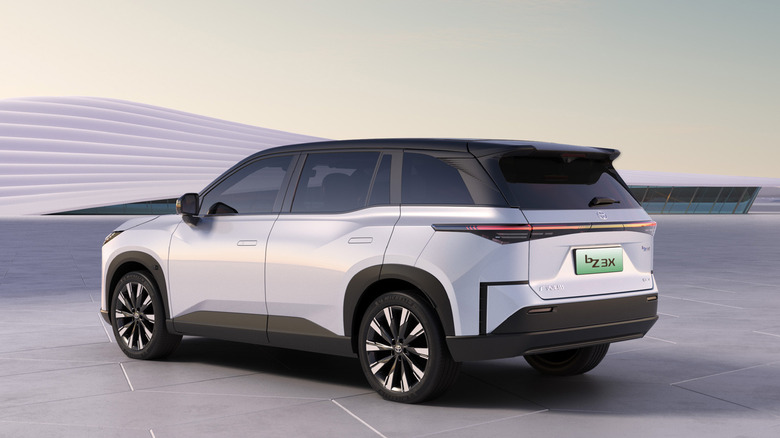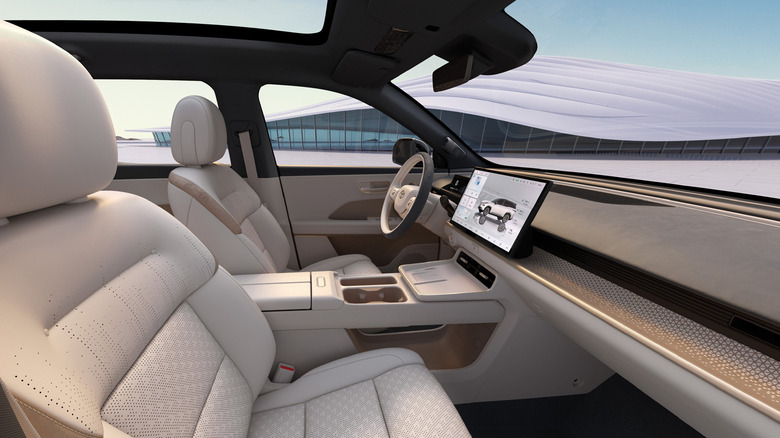What We Know So Far About Toyota's Full Self-Driving EV
Toyota, which has had an extensive history making hybrid vehicles, isn't really known for electric vehicles (EVs). Toyota tried making EVs in the past but almost gave up on the EV space after the less than spectacular customer reception to the second-generation RAV 4 EV, which featured motors made by Tesla, batteries made by Panasonic, and a body made by Toyota. The production ran between 2012-2015, with only 2,400 units shipped.
Fast forward to a decade later, and Toyota is again entering into the EV market and reportedly even going a step ahead by making a car with full self-driving (FSD) capability. While the company already sells the Toyota bZ4X electric car (also known as the Bozhi 4X) in the U.S., it is the company's Chinese subsidiary — GAC Toyota — that confirmed that it is working on a new EV called the Toyota bZ3X (Bozhi 3X in China) with full self-driving capability. This is quite an ambitious move from Toyota, considering the only manufacturers that sell production cars with at least SAE Level 3 FSD capability are Honda and Mercedes.
Toyota's claim about FSD capability on this new car should be taken with a pinch of salt. This is because carmakers tend to use the term full self-driving very loosely. Tesla, for example, uses the term FSD for what is, essentially, an advanced driving assistance tech. Tesla's FSD capability, in reality only qualifies as SAE Level 2, which means the car only offers advanced driving assistance features, and zero self-driving capability.
Meet the Toyota bZ3X
Buoyed by the positive reaction to the Toyota b4ZX, Toyota has embarked on an ambitious plan to develop more such vehicles. The next product in its pipeline is the in-development Toyota bZ3X SUV (also known as the Bozhi 3X in China), which the company first showcased in October 2023.
While we already knew that the Toyota bZ3X was in development, Toyota hadn't yet revealed its full self-driving capability. The company did exactly that recently via the Chinese social media platform, Weibo.
Because the bZ3X is being developed in collaboration with the Chinese state-owned GAC, the vehicle is currently designed to conform to the Chinese FSD standards. To help them with this project, GAC Toyota has tied up with Momenta Global, a company with extensive experience developing autonomous driving software. Momenta Global is, in fact, the same company that provided Mercedes-Benz with its own self-driving software.
Surprising as it may sound, another company that Toyota is also working with for the bZ3X project is Huawei, the famed smartphone and technology company that was banned in the U.S. It is unclear at this time how important a role Huawei intends to play in this project.
Will the Toyota bZ3X come to the U.S.?
While Toyota isn't known for its electric cars in the U.S., the company has been interested in getting a share of this pie for a while now. This is the reason why the Toyota bZ4X, which is the company's first all-electric EV in nearly a decade, is already selling here. That opens the door for the bZ3X to come here as well. What has yet to be determined is whether the U.S.-bound variant of the car gets the all-important FSD feature.
Getting FSD on the U.S.-bound models of the Toyota bZ3X will require Toyota to ensure the vehicle conforms to the standards and requirements set by U.S. regulatory bodies, which vary from state to state, and sometimes get even more granular. At this point, it is still unclear whether the vehicle would end up becoming just another car with SAE Level 2 FSD, or something that possesses some degree of autonomous driving capability, conforming to at least SAE Level 3 requirements.
Toyota's current plan is to launch the FSD-capable version of the bZ3X in 2025.


